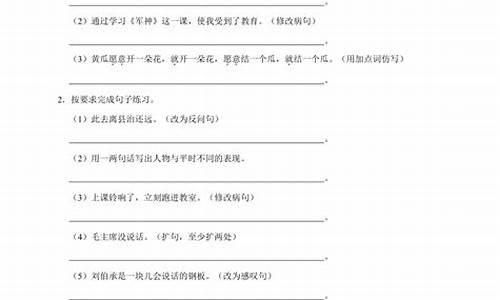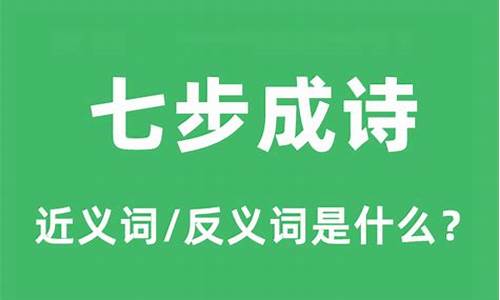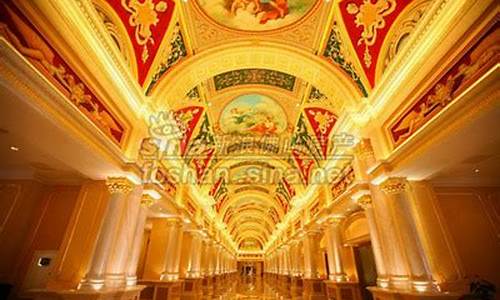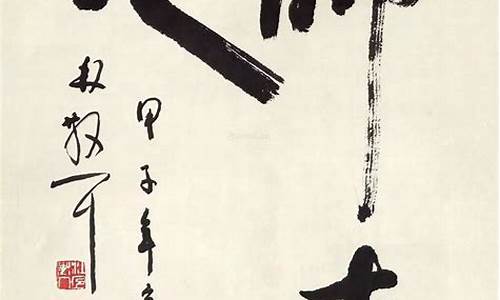您现在的位置是: 首页 > 成语解读 成语解读
灯谜英语翻译英文-灯谜英语翻译英文怎么写
tamoadmin 2024-10-15 人已围观
简介问题一:春节用英语怎么写 spring festival 问题二:春节用英语怎么说? 。。。 问题三:在春节用英语怎么说 In Spring Festival. In Chinese Lunar New Year. 问题四:春节用英语怎么说 春节的英语是: Spring Festival 问题五:春节用英语怎么说 Spring Festival 问题
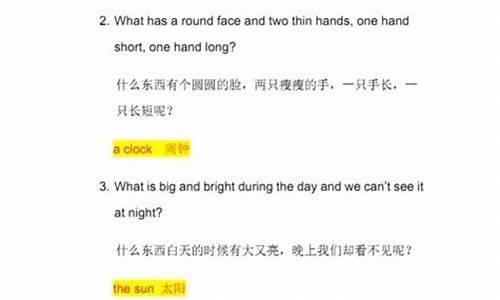
问题一:春节用英语怎么写 spring festival
问题二:春节用英语怎么说? 。。。
问题三:在春节用英语怎么说 In Spring Festival.
In Chinese Lunar New Year.
问题四:春节用英语怎么说 春节的英语是:
Spring Festival
问题五:春节用英语怎么说 Spring Festival
问题六:关于春节的英语单词 春节 The Spring Festival
农历 lunar calendar
正月 lunar January;
除夕 New Year's Eve;
初一 the beginning of New Year
元宵节 The Lantern Festival
烟花 fireworks
爆竹 firecrackers
红包 red packets
舞狮 lion dance
舞龙 dragon dance
过年 have the Spring Festival
春联 Spring Festival couplets
剪纸 paper-cuts
年画 New Year paintings
买年货 do Spring Festival shopping
敬酒 propose a toast
灯笼 lantern
戏曲 traditional opera
杂耍 variety show
灯谜 riddles written on lanterns
灯会 exhibit of lanterns
守岁 staying-up
拜年 pay New Year's call
农历 lunar calendar
禁忌 taboo
去晦气 get rid of the ill- fortune
祭祖宗 offer sacrifices to one's ancestors
压岁钱 gift money
辞旧岁 bid farewell to the old year
扫房 spring cleaning
年糕 Nian-gao
团圆饭 family reunion dinner
年夜饭 the dinner on New Year's Eve
饺子 dumpling
汤圆 Tang-yuan
八宝饭 eight treasures rice pudding
糖果盘 candy tray
什锦糖 assorted candies
蜜冬瓜 candied winter melon
西瓜子 red melon seed
金桔 cumquat
糖莲子 candied lotus seed
糖藕 candied lotus root
红枣 red dates
花生糖 peanut candy
春节 The Spring Festival
农历 lunar calendar
正月 lunar January; the first month by lunar calendar
除夕 New Year's Eve; eve of lunar New Year
初一 the beginning of New Year
元宵节 The Lantern Festival
Customs:
过年 Guo-nian; have the Spring Festival
对联 poetic couplet: two successive rhyming lines in poetry
春联 Spring Festival couplets
剪纸 paper-cuts
年画 New Year paintings
买年货 special purchases for the Spring Festival ; do Sprin......>>
问题七:英文翻译春节习俗 Chinese Spring Festival celebrating the end of winter and the warmth of spring. It began in the last day of the lunar year, end in the 15th day of lunar New Year, also is the Lantern Festival. During the Spring Festival, people use red lantern and Spring Festival couplets decorate a house, put on all kinds of colored clothes, often visit friends and relatives or together eat dumplings, fish, meat and other delicious food. The children are looking forward to receiving red envelope money, and together they play each other the fireworks, with happy. Street with dragon and lion dance and some other carnival activities, CCTV will held the grand Spring Festival gala.
翻译:中国的春节庆祝冬天的结束和温暖春天的来临。它开始于农历年的最后一天,结束于农历正月十五,也就是元宵节。在春节期间,人们用红灯笼和春联装饰房子,穿上各式各样的彩色衣服,经常拜访亲戚朋友或聚在一起吃饺子、鱼、肉和其他美味的食物。孩子们盼望着收到红包的压岁钱,他们一起放烟花,相互玩的跟开心。大街上有舞龙、舞狮和其他一些狂欢活动,中央电视台会举行盛大的春节联欢晚会。
问题八:过春节用英文怎么说? Celebrating the Chinese Spring Festival
问题九:我喜欢春节。用英语怎么说? I like the Spring Festival
问题十:用英语写春节的时间,怎么写 Spring Festival is the most important festival in China .In the evening before the Spring Festival ,families get together and have a big meal .In many places people like to set off firecrackers .Dumplings are the most traditional food .Children like the festival very much ,because they can have delicious food and wear new clothes .They can also get some money from their parents. This money is given to children for good luck . People put New Year scrolls on the wall for good fortune .
中国传统节日用英文怎么说
Idioms of lantern riddles on the 15th day of the first month。
元宵节是中国的传统节日,元宵节俗的形成有一个较长的过程,据一般的资料与民俗传说,正月十五在西汉已经受到重视,汉武帝正月“上辛夜”在甘泉宫祭祀“太一”的活动,被后人视作正月十五祭祀天神的先声(《史记·乐书》:“汉家常以正月上辛祠太一甘泉,以昏时夜祠,到明而终”)。东汉佛教文化的传入,对于形成元宵节俗有着重要的推动意义。
汉明帝永平年间,汉明帝为了弘扬佛法,下令正月十五夜在宫中和寺院“燃灯表佛”。因此正月十五夜燃灯的习俗随着佛教文化影响的扩大及后来道教文化的加入逐渐在中国扩展开来。南北朝时,元宵张灯渐成风气。梁武帝笃信佛教,其宫中正月十五日大张灯火。
唐朝时,中外文化交流更为密切,佛教大兴,仕官百姓普遍在正月十五这一天“燃灯供佛”,佛家灯火于是遍布民间。从唐代起,元宵张灯即成为法定之事,并逐渐成为民间习俗。
农历正月十五是元宵节,又称上元节、元夜、灯节。正月是农历的元月,古人称夜为“宵”,所以称正月十五为“元宵节”。当随着社会和时代的变迁,元宵节的风俗习惯早已有了较大的变化,但至今仍是中国民间传统节日。
元宵在早期节庆形成过程之时,只称正月十五日、正月半或月望,隋以后称元夕或元夜。唐初受了道教的影响,又称上元,唐末才偶称元宵。但自宋以后也称灯夕。到了清朝,就另称灯节。在国外,元宵也以The Lantern Festival而为人所知。正月十五这一天晚上,中国人素有赏花灯、吃汤圆、猜灯谜、放烟花等一系列传统民俗活动。
翻译是在准确(信)、通顺(达)、优美(雅)的基础上,把一种语言信息转变成另一种语言信息的行为。翻译是将一种相对陌生的表达方式,转换成相对熟悉的表达方式的过程。其内容有语言、文字、图形、符号和视频翻译。
其中,在甲语和乙语中,“翻”是指的这两种语言的转换,即先把一句甲语转换为一句乙语,然后再把一句乙语转换为甲语;“译”是指这两种语言转换的过程,把甲语转换成乙语,在译成当地语言文字的过程中,进而明白乙语的含义。二者构成了一般意义上的翻译,让更多人了解其他语言的含义。
中国传统节日的英语有哪些?(要翻译的)谢谢了!
中国传统节日中英对照
1.New Year's Day 元旦(1月1日)
2.Spring Festival;Chinese New Year's Day 春节(农历一月一日)
3.Lantern Festival 元宵节(农历一月十五日)
4.International Working Women's Day 国际劳动妇女节(3月8日)
5.Arbor Day 植树节(3月12日)
6.Postal Day 邮政节(3月20日)
7.World Meteorology Day 世界气象节(3月23日)
8.Ching Ming Festival ;Tomb-sweeping Festival 清明节(4月5日)
9.International Labour Day 国际劳动节(5月1日)
10.Chinese Youth Day 中国青年节(5月4日)
11.Nurses' Festival 护士节(5月12日)
12.Dragon Boat Festival 端午节(农历五月初五)
13.International Children's Day 国际儿童节(6月1日)
14.The Party's Brithday 中国***成立纪念日(7月1日)
15.The Army's Day 建军节(8月1日)
16.Mid-Autumn (Moon)Festival 中秋节(农历八月十五)
17.Teacher's Day 教师节(9月10日)
18.Double-ninth Day 重阳节(农历九月九日)
19.National Day 国庆节(10月1日)
20.New Year's Eve 除夕(农历十二月三十日)
中国常见传统活动中英对照
过年 celebrate the spring festival
春联 spring festival couplets
剪纸 paper-cuts
年画 new year paintings
买年货 do shopping for the spring festival ; do spring festival shopping
敬酒 propose a toast
灯笼 lantern
烟花 fireworks
爆竹 firecrackers (people scare off evil spirits and ghosts with the loud pop.)
红包 red packets (cash wrapped up in red paper, symbolize fortune and wealth in the coming year.)
舞狮 lion dance (the lion is believed to be able to dispel evil and bring good luck.)
舞龙 dragon dance (to expect good weather and good harvests)
戏曲 traditional opera
杂耍 variety show
灯谜 riddles written on lanterns
灯会 exhibit of lanterns
守岁 staying-up
拜年 pay new year's call; give new year's greetings; pay new year's visit
禁忌 taboo
去晦气 get rid of the ill- fortune
祭祖宗 offer sacrifices to one's ancestors
压岁钱 gift money; money given to children as a lunar new year gift culture note: in the old days, new year's money was given in the form of one hundred copper coins strung together on a red string and symbolized the hope that one would live to be a hundred years old. today, money is placed inside red envelopes in denominations considered auspicious and given to represent luck and wealth
辞旧岁 bid farewell to the old year
扫房 spring cleaning; general house-cleaning
年糕 nian-gao; rise cake; new year cake
团圆饭 family reunion dinner
年夜饭 the dinner on new year's eve
饺子 jiao-zi; chinese meat ravioli
四级汉译英翻译:元宵节 要求 正月是农历的元月,古人称夜为“宵”,所以称正月十五为元宵节。元宵节是
碰巧前几天在网上看到了类似的文章,转给你你。
春节的特殊词:
春节 The Spring Festival
农历 lunar calendar
正月 lunar January; the first month by lunar calendar
除夕 New Year's Eve; eve of lunar New Year
初一 the beginning of New Year
元宵节 The Lantern Festival
Customs春节的风俗习惯:
过年 Guo-nian; have the Spring Festival
对联 poetic couplet: two successive rhyming lines in poetry
春联 Spring Festival couplets
剪纸 paper-cuts
买年货 special purchases for the Spring Festival ; do Spring Festival shopping
年画 New Year paintings
敬酒 propose a toast
灯笼 lantern: a portable light
烟花 fireworks
爆竹 firecrackers (People scare off evil spirits and ghosts with the loud pop.)
红包 red packets (cash wrapped up in red paper, symbolize fortune and wealth in the coming year.)
舞狮 lion dance (The lion is believed to be able to dispel evil and bring good luck.)
舞龙 dragon dance (to expect good weather and good harvests)
戏曲 traditional opera
杂耍 variety show; vaudeville
灯谜 riddles written on lanterns
灯会 exhibit of lanterns
守岁 staying-up
禁忌 taboo
拜年 pay New Year's call; give New Year's greetings; New Year's visit
去晦气 get rid of the ill- fortune
祭祖宗 offer sacrifices to one's ancestors
压岁钱 gift money; money given to children as a lunar New Year gift
Culture Note春节文化:In the old days, New Year's money was given in the form of one hundred copper coins strung together on a red string and symbolized the hope that one would live to be a hundred years old. Today, money is placed inside red envelopes in denominations considered auspicious and given to represent luck and wealth
辞旧岁 bid farewell to the old year
扫房 spring cleaning; general house-cleaning
Food names春节食品名称:
年糕 Nian-gao; rise cake; New Year cake
团圆饭 family reunion dinner
年夜饭 the dinner on New Year's Eve
八宝饭 eight treasures rice pudding
汤圆 sweet dumplings; dumplings made of sweet rice, rolled into balls and stuffed with either sweet or spicy fillings
糖果盘 candy tray:
什锦糖 assorted candies - sweet and fortune
蜜冬瓜 candied winter melon - growth and good health
金桔 cumquat - prosperity
红枣 red dates - prosperity
糖莲子 candied lotus seed - many descendents to come
糖藕 candied lotus root - fulfilling love relationship
花生糖 peanut candy - sweet
Blessing春节英语祝福:
Treasures fill the home 财源广进
Business flourishes 事业兴隆
Peace all year round 岁岁平安
Wishing you prosperity 恭喜发财
Harmony brings wealth 家和万事兴
May all your wishes come true 心想事成
Everything goes well 万事如意
The country flourishes and people live in peace 国家富强、人民安康
Money and treasures will be plentiful 财源茂盛
Wishing you every success Promoting to a higher position 事业有成、更上一层楼、蒸蒸日上
Safe trip wherever you go 一帆风顺
Wish you happiness and prosperity in the coming year! 祝你新的一年快乐幸福
Wish you success in your career and happiness of your family! 事业成功,家庭美满(阖家欢乐)
中国新年禁忌:Dos and Donts of Chinese New Year
Do's:
Wish everyone you meet a happy New Year by saying "gong xi fa cai", which translates to: "Have a happy and prosperous New Year!" 对每一个你遇到的人道一声:"恭喜发财",翻译成英文就是:"在新的一年里拥有幸福繁荣的生活";
Wear articles of red clothing because red symbolizes luck. 穿红色布料做成的饰品,因为红色昭示着幸运;
Eat vegetarian food because it's not good to see blood. 吃素食,因为见血是不吉利的;
Buy new trousers because the Chinese word for trousers is "fu", (Chinese homonym for wealth) 买新裤子(衣服),因为汉语里裤子就是"服",(在汉语里与财富的"富"谐音);
Children should stay up as late as possible on New Year's Eve for it is believed that the later they stay up, the longer their parents will live. 孩子应该在除夕之夜尽可能晚睡、熬夜因为据说他们睡的越晚,他们的父母越长寿;
Visit family (especially those older than yourself) and friends to pass on your wishes on good fortune for the New Year. (plus kids and single people will receive lai-see lucky red packets full of money. 拜访亲戚朋友(尤其是比你年长的),传递你对他们来年幸福的美好祝愿(另外孩子和单身的人将会得到装满钱的幸运红包,称为"来喜".)
Give two lai see to each child. Because happiness comes in two's, do not just give one. This is your way of passing good luck to the next generation. Business owners also give lai see to employees and associates. 给每个孩子两份"来喜"(我觉得应该指钱是偶数的),因为好事成双,不要只给一份.这是你把祝愿传递给下一代的方法.企业主(老板)也要给员工和同事红包.
Don'ts:
Don't wear white or black clothing, since they are the traditional colours of mourning. 不要穿白色或黑色服装,因为这是传统意义上丧事的颜色;
Don't buy new shoes for the first month of the New Year, because the sound of shoe in Chinese is "hai". "Hai" is similar to the sound of sighing, which Chinese believe is not a good way to start the year. 不要在新年的第一个月买新鞋,因为在汉语里鞋的发音是"孩"(好像是四川地区的发音), 它与叹息"唉"相近,中国人认为这不是新年伊始的好兆头.
Don't wash your hair for the first three days of the New Year, because the Chinese word for hair is a homonym for the Chinese word for wealth. Therefore, Chinese believe it isn't a good thing to 'wash away your wealth' right at the start of the New Year. 在新年的前三天里不要洗头,因为汉语里"头发"的"发"和"发财"的"发"同音.因此,中国认为在新年伊始把财富给冲走可不是好兆头.
Floors may not be swept and garbage may not be disposed of on the first day of the New Year for fear of casting riches out the door. 在新年第一天,不拖地,不扔垃圾,因为怕把"财"给送走了;
Don't swear or quarrel. 不要诅咒发誓,也不愿吵架;
Don't break any dishes, otherwise you may incur more misfortune for the New Year. In the event of breaking a dish, quickly say " Peace for all time", and the bad luck will be warded away. 不要打破碗碟,否则在来年你可能会遭遇不幸.一旦打破了,要马上说"岁岁平安",这样坏运气就会被赶走了;
Don't greet people who are in mourning. 不要向服丧期的人们问候(主要指不要说喜庆的话吧?)
Don't drop your chopsticks. 不要让筷子掉地上;
Don't say the number 'four' (Chinese homonym for death) or mention death. 不要说数字"四"(汉语里和""谐音)或者提到;
Don't borrow or lend money. 不要借钱也不要借给别人钱
请英语高手为我翻译几个灯谜,非常重要!
正月是农历的元月,古人称夜为“宵”,所以称正月十五为元宵节。元宵节是中华民族的传统节日,也是春节之后的第一个重要的节日。这是新年的第一次满月,象征着和睦和团圆。按民间传统,人们要点彩灯庆贺,还要吃元宵,赏花灯,猜灯谜(riddle)等。元宵节猜灯谜的习俗最初起源于宋代,由于谜语既启迪智慧又增加节日气氛,响应者众多,而后猜谜逐渐成为了元宵节不可缺少的节目。
January is the first month of the lunar calendar, the ancients called the night as "night", so called the fifteenth day of the Lantern Festival. Lantern Festival is a traditional festival of the Chinese nation, is the first major holiday after the Spring Festival. This is the first full moon of the New Year, a symbol of harmony and reunion. According to folk tradition, people point lanterns to celebrate, but also to eat Lantern, flowers lights, riddles (riddle) and so on. Lantern riddles custom originated in the Song Dynasty, both due to the riddle enlightened wisdom adds a festive atmosphere, many respondents, then gradually become a guessing Lantern indispensable programs.
题目1是:
What does man love more than life?
甚麼是一些人比自己的命还要爱的?
Fear more than death or mortal strife?
比或凡人纷争还要可怕的?
What do the poor have, what the rich require,
甚麼是穷人有和富人须要的?
And what contented men desire?
和甚麼可以满足人的 欲望?
What does the miser spend, the spendthrift save,
甚麼是吝啬鬼会花费而 败家子节省的?
And all men carry to their graves?
和甚麼是人人都会带到坟墓去的?
答案是:Nothing. 甚麼都没有
题目2是:
Sir, I bear a rhyme excelling
先生,我身怀音韵的擅长
In mystic force and magic spelling
在神秘的力量和神奇的拼写
Celestial sprites elucidate
天体澄清的精灵
All my own striving can't relate
与我自己所有努力毫无关连
答案是:The number PI, the digits of which are illustrated by the length of each word in the riddle.
是圆周率数字,谜语的每个字与号码已绘划了出来。
题目3是:It is said among my people that some things are improved by death. Tell me, what stinks while living but in death smells good?
在我之间的人常说,一些东西後会有改进。甚麼生时臭後会香的?
答案是:A pig 一头猪。
题目4是:I went into the woods and got it. I sat down to seek it. I brought it home with me because I couldn't find it. What is it?
我走进树林得到它,我坐下去寻它,我把它带回家因为我找不到它,那是甚麼?
答案是:A splinter. 一枚刺
替你翻译了,很高兴能够帮到你,希望对你有助,并望满意,谢谢。


